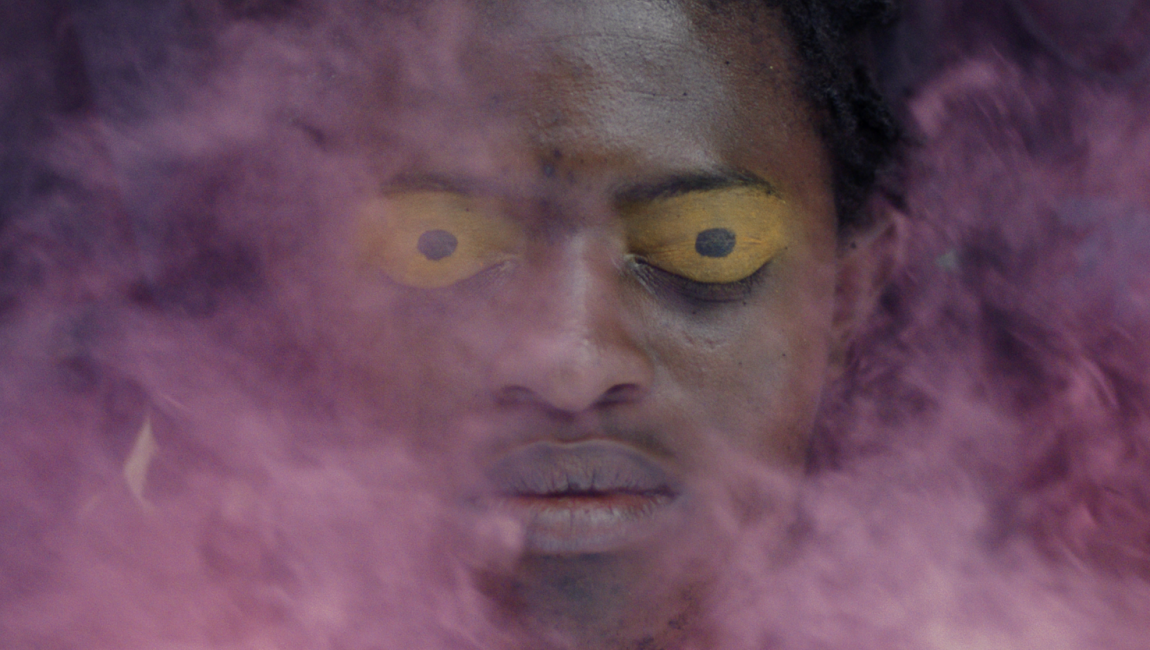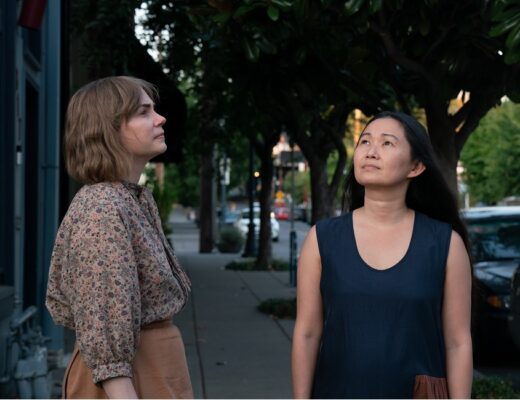Belgian-Congolese rapper Baloji’s feature directorial debut, Omen, is a promising if not confident fable. Koffi (Mark Zinga) and Alice (Lucie Debay) return home to the former’s birth country, from which he was sent away for a Rorschach-esque blot on his face and the resulting allegations of sorcery, to ask for their marriage to be blessed. Koffi’s isolation for his alleged sorcery is entwined with his outsider status after returning from Europe. The sweat stains on his shirts and uneasy memories of language isolate him just as much as the mystical rumors about him do: a stranger to his own family, tactfully demonstrated as they watch with unease as he coos at his baby nephew, unaware of their distrust. Alice is particularly uneasy during this homecoming; she doesn’t know whether to be apprehensive, and has no context for how her fiancé is treated and feared. The couple had thought Alice’s pregnancy would make their impending marriage easier to explain, but it only complicates how Koffi has to justify his life outside of home (an unnamed city, mostly filmed in, but not stated as, Kinshasa) — even when “home” found it easier with him gone.
Omen is hyper-sensory, opting for spectacle over document wherever possible. True to tradition, the masks and costumes are bright and beautifully crafted, though they evoke more Mardi Gras influence than cultural accuracy. Thick clouds of colorful smoke, shades of fuchsia and magenta, ceremonially engulf the characters; smoke whirling to the tune of a soundtrack that’s more standalone mixtape than complementary score. These flashy visuals make returning home for Koffi feel otherworldly, where something as mundane as a nosebleed can be construed as the ritualistic spilling of blood. Such visual excess is particularly present when young magician Paco, (Marcel Otete Kabaya) and his pink dress-clad gang, crosses paths with Koffi. Paco received the same leveled accusations growing up as Koffi did, but learned to monetize the circumstance and live with his ostracism. Encounters with others treated the same way as him, including his sister independent-minded Tshala, only serve to complicate the Koffi’s relationship to home, as he finds out how these others have learned to exist in balance.
Where Baloji’s film begins to falter is in its structure. The respective, sorcery-specific storylines of Koffi, Paco, Tshala, and Mujila are loosely woven, and the film straddles an awkward line between anthology film and multi-lead, Magnolia-esque odyssey, without ever firmly amounting to either (though it’s somewhat billed as the latter). Omen’s meandering, multi-threaded structure sets Koffi as our primary lead — and something of an audience surrogate — at the expense of exploring how the women are treated for their similar instantiations of witchcraft. Among the recent wave of African magical realism arriving to the Croisette, Omen is on shakier ground than such breakouts as I Am Not a Witch or Neptune Frost, simply by failing to meaningfully explore all four leads and rendering some as footnotes. As family members of our alienated protagonist, and as women who — in their world — are trapped within the world of superstition due to their status as accused, Tshala and Mujila have a fascinating relation to the religion that surrounds them, a promising conceit which the film’s short runtime sadly only teases. Omen’s lasting impression is but a taste of the sprawling family omnibus of faith and isolation that the film could have been.
DIRECTOR: Bajoli; CAST: Eliane Umuhire, Marc Zinga, Lucie Debay, Yves-Marina Gnahoua; DISTRIBUTOR: Utopia; IN THEATERS: April 12; RUNTIME: 1 hr. 30 min.
Originally published as part of InRO Weekly — Volume 1, Issue 21.







